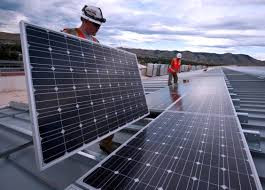A coalition of seven U.S. solar manufacturers filed petitions with the federal government on Wednesday, requesting the imposition of tariffs on solar cell imports from Cambodia, Malaysia, Thailand, and Vietnam. The manufacturers, including First Solar and Qcells, allege that companies in these countries are flooding the U.S. market with cheap products, threatening the domestic industry.
The petitions, filed with the U.S. International Trade Commission (ITC) and the Department of Commerce, claim that the four Southeast Asian nations are dumping solar cells on the U.S. market at prices below the cost of production or are benefiting from subsidies that leave domestic manufacturers unable to compete. The companies under investigation are primarily headquartered in China, with the U.S. manufacturers alleging that the Chinese government is providing subsidies through its Belt and Road Initiative.
"This petition is not asking for special treatment from the US government," said Tim Brightbill, the lead attorney in the case. "It is simply asking that our current trade laws be enforced."
The move has divided the U.S. solar industry, with several trade groups, including the Solar Energy Industries Association and American Clean Power Association, expressing their concern that the petitions could lead to further market volatility and uncertainty. They called on the White House to consider alternative solutions to support U.S. solar manufacturers.
Array Technologies, a manufacturer of solar tracking technology, also opposed the petitions, stating that more duties would cause unnecessary project delays and hold the U.S. back in meeting its clean energy goals. "This case is bad news for clean energy jobs and American solar manufacturing," said Array CEO Kevin Hostetler.
The global solar market has experienced a significant supply glut, with solar panel prices plummeting nearly 50% in 2023 compared to the previous year. According to the International Energy Agency, China's market share of global supply chains is between 80% and 95%.
Treasury Secretary Janet Yellen recently told CNBC that the Biden administration would not rule out imposing tariffs on subsidized clean energy exports from China. The ITC and Commerce Department investigations are expected to take about 12 months to conclude, with the possibility of tariffs being imposed after a preliminary determination by the Commerce Department in four to six months.
Growing the U.S. solar industry and its supply chain is a key part of the Biden administration's climate agenda. However, domestic manufacturers continue to struggle in the face of competition from cheaper imports from Asia, prompting these companies to fight back through trade petitions.
The petitions align with a new final rule that went into effect on Wednesday, updating the enforcement and administration of U.S. antidumping duty and countervailing duty laws. The rule allows the Commerce Department to consider cross-border subsidies in its investigations, incorporating subsidies companies receive from China in their calculations.
A White House spokesperson said that while the administration would not weigh in on the specifics of the petitions, it is monitoring potential unfair market practices by China aimed at undermining global markets for key sectors, including solar manufacturing.






